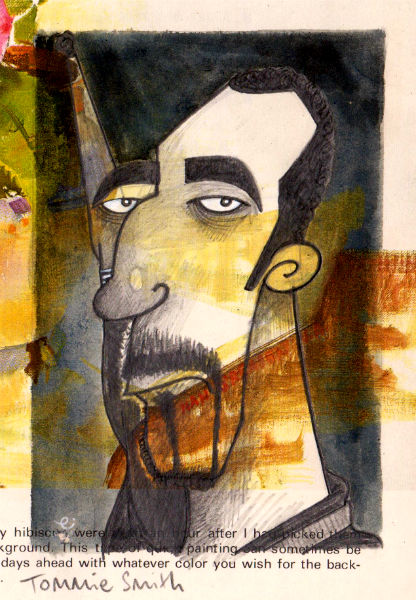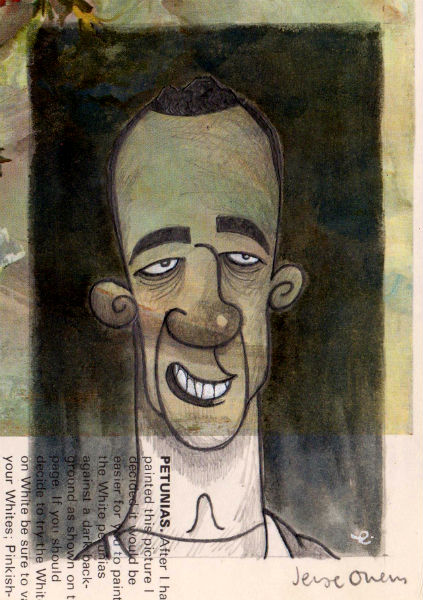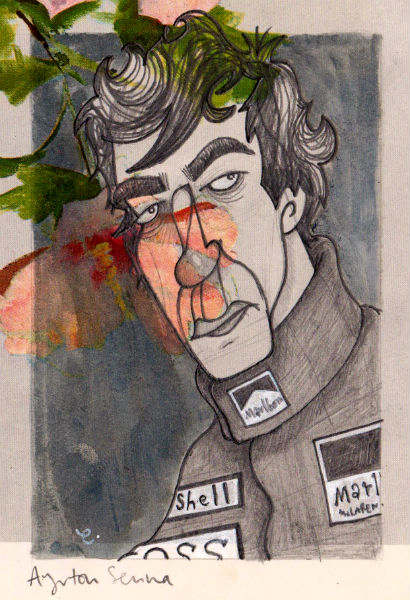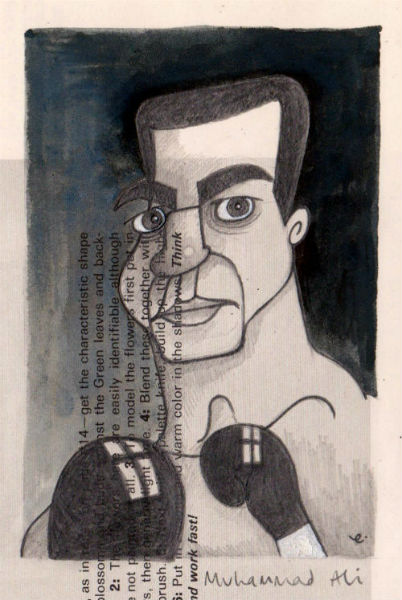Last year I made five drawings of the five people who I consider to be the greatest sports stars of the 20th Century and with typical efficiency I am only now doing anything with them. I love sport more than anything else, I think. Like great music or art, it transcends human experience with a potency far outreaching its remit. But, unlike music or art, it retains a crucial element of total objectivity. There are winners and losers in sport; for all the discussion and for all the postulation there will always come a time when all the bullshit must, through absolute necessity, stop. It is this which appeals to me on such a fundamental level. Elemental, even. I need it.
Choosing five outstanding people from the sporting field is foolhardy in the extreme and invariably shot through with bias, blind spots and flaws. Complaints to the usual place, perhaps. Or, even better, how about making your own list? Creative solutions to internet-based disagreement is surely the way forward. For my choices, I tried to pick five people whose greatness went beyond their particular field of endeavour. They are people who made a wider social impact, through their values, their example or their personality.
I consider them to be five of the most inspirational people the Twentieth Century produced.
5. Tommie Smith (1944-) - Athletics
Tommie Smith crystallised an entire movement in one single perfect moment. On 16th October 1968 at the Mexico City Olympics, he won the 200 metres sprint in 19.83 seconds. It was an heroic enough performance as it stood: he had been nursing a hamstring injury through the heats and his display in the final was astonishing, the first time that 200 metres had been officially run in under twenty seconds in human history.
Quite rightly, however, Smith is better remembered for what he did on the podium. 1968 had been a year of tumult. In his homeland, it had seen the assassination of Martin Luther King and Robert Kennedy and the worsening of the conflict in Vietnam. The Civil Rights struggle was far too deeply ingrained to be solved simply by recourse to legislature and racial tension remained a tinderbox across the United States. As for the rest of the world, similar life-and-death struggles for recognition, for freedom and for human rights also raged: Northern Ireland, Warsaw, The Prague Spring, student uprisings in France and West Germany; the continuing stain of Apartheid in South Africa, as well as continuing tension in Israel and Palestine.
Tommie Smith's black gloved raised fist salute was seen as being a symbol of black power and association with the nascent Black Panther movement. In truth, it represented support for everything that is good and just in a year that had, at times, looked set to spiral out of control. Even if in the moment he, silver medallist Peter Norman of Australia and Smith's American teammate John Carlos may have not realised what an epochal gesture they had made, nearly 50 years on it remains the single most staggeringly eloquent reminder of sport's social potency.
Of course, Smith's reward was to be canned. Both he and Carlos were immediately sent home from the Olympics and made pariah by a significant proportion of American society. The following year, Smith moved into American Football, playing two games for the Cincinnati Bengals before becoming both a sociology teacher and an athletics coach at Oberlin College, Ohio.
4. Jesse Owens (1913-1980) - Athletics
Jesse Owens was one of the greatest track athletes in history. During the 1935 Big Ten athletics meeting at Ann Arbor, Michigan, he broke three world records within 45 minutes. The following year, he won four gold medals in the 100 metre sprint, 200 metre sprint, 4x100 metre sprint relay and long jump at the Berlin Olympics.
Owens never set out to be a hero or a warrior for social justice. Both things just sort of caught up with him, even when nothing else could. He remains the ultimate fly in the ointment, the most celebrated up yours to the most insidious and evil political regime of modern human history. Adolf Hitler had, of course, designed the Berlin Olympics to be as carefully choreographed a love letter to the innate superiority of his Aryan supermen as any sporting event could be. But he had not reckoned on the basic truth of the forces at work in the sporting arena. 1936 was Owens' time and he would not be - could not have been - denied.
Much has been made of the Fuhrer's avoidance of Owens following his Olympic success. Debate still continues as to whether or not this was the result of prior engagements, a desire to not be caught out in an impending rainstorm or his virulent racism. The possibility even remains that the Nazi leader did seek out and congratulate Owens but that it was subsequently hushed up. The fact remains that Owens' feats were all featured in Leni Reifenstahl's state-funded 1938 film of the event, Olympia, whilst at home he remained a second-class citizen. It is this frequently ignored story which speaks with the greatest volume about the legacy of Jesse Owens, a campaigner for civil rights and social justice. He always maintained that it was not Hitler who snubbed him but his own President. "[He] didn't even send a telegram".
3. Ayrton Senna (1960-1994) - Motor racing
Ayrton Senna was the fastest racing driver who has ever lived. He drove like the devil was after him and he was trying to get away. And as fanciful a narrative as that sounds, the man himself would leave you in some doubt as to whether or not it was what was at stake. There are few people possessed of the kind of single-minded dedication, control and ability to achieve all that Senna did in his brief life, fewer still able to articulate it in quite the same mesmerising way that he did: all the more remarkable if you consider that he was often doing so in a second language.
The winner of 41 Grands Prix, three Formula 1 World Championships and 65 pole positions - the latter a record that it took even Michael Schumacher nearly a hundred additional career races to overhaul - Senna's numbers remain impressive but, as is the nature of many statistics, are slowly being subsumed by history. What will not go away is the story. Senna's electrifying presence transfixed the motor racing world; Formula 1 was Ayrton Senna and to set out to conquer it meant beating him. What will never go away is the footage. Some of it shows him doing things which are devious, questionable or downright reprehensible, all reminders of the fundamental flaws that reside within human beings. These were foes to overcome all as real as Alain Prost, Nelson Piquet, Nigel Mansell or Michael Schumacher. What will never go away is the sight of a man propelling a racing car along at a speed at which his rivals were either unable or unwilling to match.
Senna was a remarkable man. Born of considerable privilege and wealth, he nevertheless remains nothing less than a hero to millions of his disenfranchised and poverty stricken Brazilian countrymen. Clearly flawed and prone to behaviour on track so nefarious it could probably have been tried in a court of law, he remains a hero to every journalist and motorsport fan, one whose legacy grows with each passing year. Had he survived the crash in the 1994 San Marino Grand Prix which claimed him, he could well have been the President of Brazil by now. Or of the United Nations. He may even have been able to swing Pope. To assume anything less of Ayrton Senna always was to be confounded by him.
2. Billie Jean King (1943-) - Tennis
So much of the story of Twentieth Century sport, as with its history, is entangled with the story of race that it is easy to forget that the battle for equality was never just confined to the colour of a person's skin. Women's rights and LGBT rights were - are - just as defining and active a social battleground. Billie Jean King was a pioneer, a leader and a spokeswoman; a brilliant competitor who could have made all her most telling points on the court but chose to speak out off it as well. Moreover, she still is and still does all of these things.
Much is made of her participation in the famous Battle Of The Sexes tennis match, an event between the top female player of the day and Bobby Riggs, the 1939 Wimbledon singles champion who, at 55-years old believed he was still the match of any modern female player. King disabused him of this notion, defeating him comfortably 6-4, 6-3, 6-3. But in reality this was just a spectacle for the television and a silly old fool getting his comeuppance. Billie Jean King is better remembered for the way she lived her life day to day, a fact summed up by her belief that her most famous match's key virtue was getting people interested and enthused about the sport of tennis.
As a player she was an indefatigable competitor. Combined with a longevity rare in such a high impact sport - her career spanned four decades and lasted 24 years - it makes the case for her inclusion on any list of sporting greats on a statistical basis alone. What truly sets King apart for me is her bravery. It takes considerable courage to choose to continually put your head above the parapet because it is the right thing to do, especially when you are successfully operating in an arena which would make anyone quite able to happily and quietly feather their nest ready for a peaceful retirement. King refused to stand down; on the issue of professionalism in tennis, on the issue of equality for women, or on the issue of the acceptance of homosexuals into society. To this day, if Billie Jean speaks openly on any subject, we had better all be listening.
1. Muhammad Ali (1942-) - Boxing
Muhammad Ali is the greatest. We have no excuse for this coming as a surprise as he has been telling us all for decades. It is perhaps to his greatest credit that the scale of his achievement - as a sportsman and as a human being - was such that it was nevertheless still surprising.
No other sporting figure has ever blurred so many social boundaries. He was both of our time and for all time; initially just a boxer, his extraordinary personality made him a star at a time in America where black people were supposed to know their place. Ali stood up and was counted. When this, as it inevitably would, made him enemies he stood louder and prouder. When they took away what was rightfully his he won it back in such impossibly heroic circumstances that it would be dismissed out of hand as a film treatment as simply too unbelievable.
Ali is a continual reminder to me that the search for a higher power is best attempted by looking around you. A glimpse into the eyes of Ali, even now as a frail man broken by disease and dulled by age, leaves me in no doubt as to his other-worldly power to inspire greatness in those around him. There will never be another sportsman who so unifies as many disparate sections of human society as Muhammad Ali. The greatest tribute of all is that, principle among the reasons for this is that Ali existed in the first place.
The five pictures that illustrate this piece are available to buy for £25 each, or £125 for the full set (including Pelé, who didn't make the cut). If you are interested, drop me a message on Facebook or send me an email.






No comments:
Post a Comment